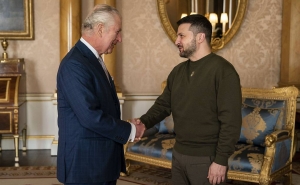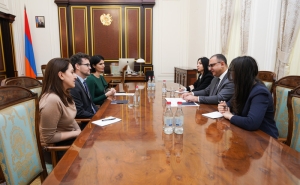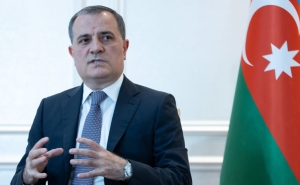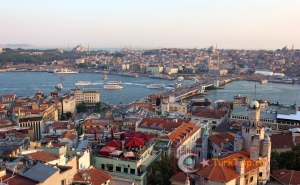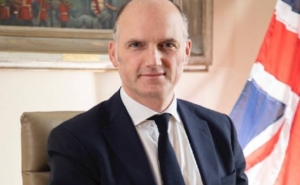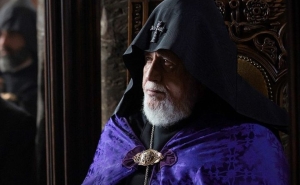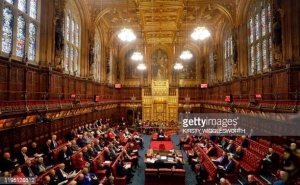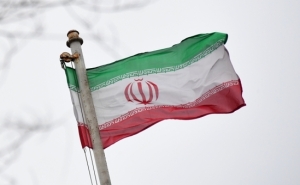Kingsley Donaldson: Civil Society Can Open Up Tunnels of Communication for Conflicting Parties

“Armedia” IAA presents an exclusive interview with the Director of Causeway Institute for Peace Building and Conflict Resolution, an Army officer currently commanding a specialist reconnaissance unit, Kingsley Donaldson. The interview was taken in the framework of the workshop "The Complexity of Peace Processes: Lessons from Northern Ireland and Scotland Cases" held in Yerevan on September 25-28*.
- Will you, please, share your impressions from the workshop?
- I have enjoyed myself being here. It was very useful to talk openly about what we did in Northern Ireland, about the role of civil society and how those things might reflect in other places including here. It was enlightening to see the change in people from the beginning of the workshop, when they were quiet, they did not wish to engage, to talk about Armenia and Nagorno-Karabakh conflict - to the end of the workshop, when I though we just began to explore some of the issues that are really very important and sensitive. So I really enjoyed it and I think it was very purposeful and progressive. It also set good foundations for further work.
- Now if we pass to the concept of the image of enemy and peace building process in general, what do you think, what is the most efficient and effective method governments should employ to work with their societies to help them overcome the image of enemy?
- My first big observation is that even if civil society cannot directly participate in the negotiation process with another country over a conflict, the government can still encourage the civil society to grow and develop in their own country, because no doubt one day these things will come up for consideration and negotiation. A civil society must play a role in that. Our lesson in Northern Ireland is not to make a civil society wait until a peace process starts or it is concluded, but to get civil society operating now. So that confidence and relationships can be developed with people from another country, ideas can be explored, view can be better understood, and sometimes when being better understood these views turn out to be not as extreme as people think. And perhaps from this civil society groups new generations of politicians will come up, who will feel that they have got the relationships they can use to open up tunnels of communication with other people. And I think once you start that engagement at civil society level you are forced to re-consider what your relationship is with the people in the other country, you are forced to re-consider what constitutes an enemy, what makes up an opponent - do I dislike how they look, how they speak, what they say, how they dress, or their flag, their culture, what is particular that I don’t like? Do I dislike it more than I dislike another country that has done wrong and unspeakable things to my country? And those comparisons, those views will help to diffuse the notions of opponents and enemies and will help to appear in an environment, where people consider each other equals. That does not mean you have to agree with them nor it means that your views are not any less relevant, nor your views are diminished. It just allows opening up a dialogue. A dialogue which is a really key aspect for building the preliminary aspect for peace process.
- Will you mention some particular methods that helped civil society in the peace process of Northern Ireland?
- First of all I think government in Dublin, London and Belfast played a critical role in helping to fund a civil society, so they supported the development of civil society financially. Government also changed and relaxed rules about the nature of the activities the civil society can conduct. They also brought in different institutions such as young people’s commission, victims’ commission. They brought in groups that made alliances of civil society that previously opposed one another to find some common ground. And the government also formed a space for civil society to have a voice. They listened to them, they hosted discussions with them, and they participated in the civil society events. So by their interest, by their attendance, by their engagement they allowed the civil society to be seen more widely, as being relevant and legitimate. And I think that is an enduring message as because of it civil society now plays a key role.
- What role does democracy play in all this? Is it important for a state to be democratic to ensure such kind of participation of civil society?
- Well, yes, it helps, but it is not a critical factor. British democracy is very complicated thing. It does not always appear in the same manner or in the same type of legislative process in each of our regions and countries. So referendum in Scotland can be very different from the referendum in Northern Ireland. Our political models in the regional assembles are different. In Northern Ireland we have what is called consociation model, where you have to have representatives from all sides. A government in Scotland is all fashioned opposition versus the party with the biggest share of the electorate. In Westminister it is a different system again. So democracy exists but it manifests itself in different ways in different places. At the community level you get a vote for the local council, but at the same time you can vote for someone to be a member of the European Parliament. It is not just purely about politics, it is about society, it is about electorate, it is about participation.
We talk a lot in Northern Ireland about participative democracy. And civil society plays a very strong role in getting people interested in the country and interested in the issues, from which flows an engagement in politics. So I don’t necessarily think that some of the more extreme democratic models squeeze out civil society, I still think that civil society can flourish in those circumstance. And civil society and leadership needs to think hard not to let democratic structure necessarily be barrier to encouraging civil society to develop.
- We often speak of the problem of asymmetry in conflicting societies, when government of one conflicting party prepares its society for peace, while another does not. In this case what should the first one do to avoid defeatist moods in its own society?
- Let me be very clear, they should continue preparing for peaceful means, they must continue to develop civil society, because in case of possible war or conflict, during and after it you will need a civil society. Civil society will have to repair a lot of societal damages to resolve that conflict. The agreement the politician will come to through ceasefires and negotiations after the conflict will be given life through civil society. The peace agreement we had in Northern Ireland would be impossible if society had no capacity of doing that. The victims of the conflicts ten years ago can help the victims of recent conflict; no legislation can do this instead of civil society.
*The opinions expressed in the interview do not necessarily represent the position of the British government.
*The seminar was conducted by Marttii Ahtisaari Centre (CMI) together with its partner NGO European Integration (EI). The seminar was supported by the British Embassy in Yerevan in the framework of the United Kingdom Conflict, Security and Stability Fund.
-
 17:08
17:08The regular session of the Anti-corruption Policy Council takes place in Jermuk
-
 15:05
15:05The Prime Minister sends congratulatory messages to the supreme leader of Iran and the President of Iran
-
 11:11
11:11Armenia sends earthquake aid to Turkey
-
 10:43
10:43Commemoration of the Pontiff St. Sahak Partev
-
 09:16
09:16Some roads are closed and difficult to pass in Armenia
-
 19:55
19:55Phone conversation of the Foreign Minister of Armenia with the U.S. Assistant Secretary of State for European and Eurasian Affairs
-
 18:30
18:30Prime Minister Pashinyan and President Khachaturyan meet
-
 18:20
18:20Ararat Mirzoyan with Co-Chairman of the OSCE Minsk Group of France Brice Roquefeuil
-
 17:01
17:01Humans could land on Mars within 10 years, Musk predicts
-
 16:45
16:45France, US urge 'immediate' end to Nagorno Karabakh blockade
-
 16:01
16:01Blockaded Nagorno Karabakh launches fundraiser to support quake-hit Syria
-
 15:59
15:59Earthquake death toll in Turkey rises to 18,342
-
 15:43
15:43Ararat Mirzoyan Held a Telephone Conversation with Sergey Lavrov
-
 15:06
15:06French president rules out fighter jet supplies to Ukraine in near future
-
 14:47
14:475 Day Weather Forecast in Armenia
-
 14:44
14:44President Vahagn Khachaturyan wrote a note in the book of condolences opened in the Embassy of Syria in Armenia
-
 14:20
14:20Azerbaijan’s provocations impede establishment of peace and stability – Armenian FM tells Russian Co-Chair of OSCE MG
-
 12:57
12:57France representation to OSCE: Paris calls on Azerbaijan to restore freedom of movement through Lachin corridor
-
 11:40
11:40Command of Kosovo forces highly appreciated preparation of Armenian peacekeepers
-
 10:16
10:16The United States withdrew from sanctions against Syria for six months the provision of assistance after the earthquake
day
week
month
Humidity: %
Wind: km/h


